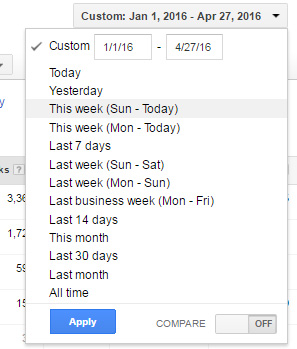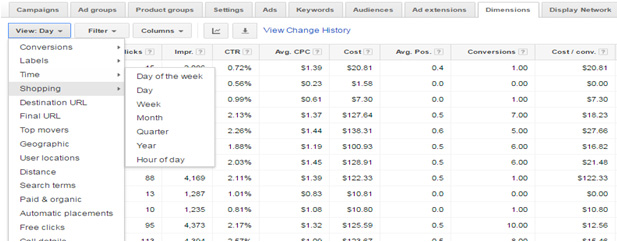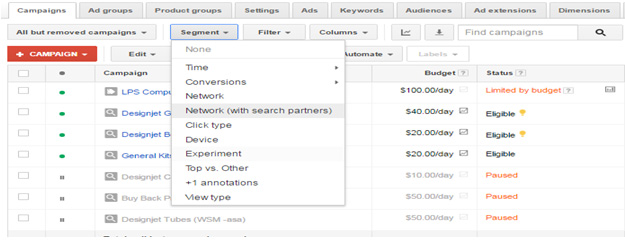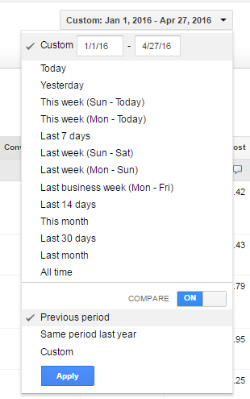[display-name-category]
[post_author]
 Before we dive into my checklist for success, there is a fundamental question that needs to be answered first:
Before we dive into my checklist for success, there is a fundamental question that needs to be answered first:
How do you know when you are succeeding at AdWords?
This may sound simple, but it is vital to determine how you will optimize your campaign. The answer to this should be the one KPI that matters most to your business. It must be reasonable and trackable with AdWords. Assuming you have answered this question, you can move on to becoming an AdWords Jedi.
There is no sure-fire way to manage an AdWords account. It all depends on the needs of that specific business. However, through my experience I have come to notice the following characteristics in healthy account owners:
Signs That You Are Managing Your AdWords Account Properly
1) You Are Proactive
You don’t wait around to get to the edge of bankruptcy to change the strategy or marketing platform even.
It might sound incredibly obvious, but most SMB’s tend to STICK to the same strategy and advertising platform until they can’t afford it anymore.
A high number of business owners such as yourself try AdWords for months and then decide that is not worth it. Ring a bell? Well, you’d be surprised to know most of these accounts maintain their initial approach and structure, same keywords, same ads, same bids, same landing pages… all throughout their time with AdWords.
Your initial approach regarding campaign structure or campaign type will need a lot of work and tweaking, or even a total revamp. Your business model is not static – your AdWords strategy shouldn’t be either.
2) You Acquire Product Knowledge
You understand new AdWords products and how they might contribute to your business bottom line.
So, you have been getting a decent Return On Investment from your campaign. Now, what? Well, if you haven’t asked yourself this question, you might be in trouble.
Allow me to ask you a couple more questions:
- Do you have a Shopping Campaign? Have you tried Dynamic Remarketing Yet?
- Are you still using the same Ad Extensions since you launched a couple of years ago? Have you heard about Structured Snippets and Callout Extensions?
- Have you tried Call Only Campaigns if it applies to your product or service?
- Do you collect client emails as part of your interaction with clients? Did you know you can target them using this valuable information?
- You want to target people that have been to your site and are actively searching for the same service or products again? Then you’re probably using a Remarketing List for search ads… or not.
A great tip on growing your business online is to stay on top of Google’s new features and see how they fit into your marketing strategy, the questions above are just a sample of opportunities that you might be missing out on.
3) You Conduct Data-Driven Analysis
Your campaign optimizations MUST be based upon significant statistical data.
As a business owner, you can’t optimize based on gut feelings and you definitely can’t let your ego get in the way.
For example, if you are optimizing solely to outrank a competitor or reach top positions because you like seeing your Ad on top all the time, then you are going to go bankrupt. Here’s why:
- You can’t afford to pay high prices for the first position without compromising your profitability.
- You might not convert as well in first positions vs. lower positions. Yes, if you segment your campaigns accurately you can convert in a lower position.
- Typically you don’t optimize just for the first position unless your approach is 100% brand exposure oriented and I am assuming that you are in the business of providing a service or selling a product.
There are three things that you must take into account when optimizing:
1) Have a Considerable Lookback Window
Don’t pause keywords, change ads or change your bid modifier without enough data. Go back until there is enough data to support your decision.
2) Segment and Dimensions
Pinpoint which elements are present when a conversion takes place: Location, Hour of Day, Device, Search Partners. Once you understand which elements coincide then you can make bid adjustments and exclude items that are only increasing your costs.
Dimensions

Segments

3) Use the Compare Feature
Assess the impact of your optimizations and compare KPI changes over time. Here’s how it looks like in the interface:

Things To Avoid When Managing Your Campaigns
1) Neglecting Your Accounts
Depending on the size and search volume of your campaigns you should have a calendar for optimizations and keep track of your changes. A few tips on this:
- Make sure to have a Google Calendar with scheduled optimizations and adhere to it. Don’t take my word for it, read this blog post on the importance of a calendar and how to create one.
- Document your changes.
- Go back in time (no, really). Check your change history and evaluate which changes could have triggered a drop in performance.
- Even if your campaign is doing “great” and you’re afraid to break it, you MUST go in and still evaluate ways of improving the performance. There is always something to work on: Search Impression Share, Quality Scores, A/B Split Test on Ads, Negative Keywords, and Campaign Expansion to name a few.
2) Setting Up A Poor Account Structure
If you don’t organize your account well since the beginning, you are setting yourself up for failure. The following is a great way for you to structure your campaigns:
- Mimic your website structure and translate it into tightly themed ad groups.
- Take into account the buying funnel when selecting keywords and ad group structure (who are you targeting and what stage of the buying funnel they’re at).
- Do not let ad groups get too big. Personally, I think an ad group that is not related to locations or miscellaneous terms should not have over 10 to 15 keywords, otherwise, it calls for breaking that ad group into more granular ones. Get a free guide on how many keywords you need when building a campaign right here.
3) Inadequate Tracking
- Which actions do you consider to be valuable when people land on your site?
- Do they all same the same value to you?
Once you figured that out, its time for you to start tracking them correctly. It is important that you learn how to set up conversion tracking and use your conversion types and values as the primary KPI for optimization purposes.
4) Setting Unrealistic Expectations
This is not a get rich quick scheme, and no agency will have you featured in Forbes from the get-go.
You have to set a realistic benchmark and weigh in factors such as:
- The lifetime value of a client
- Your own success rate when closing leads
- How limited your budget is as compared with industry leaders
- Whether you have a valued proposition that will set you apart from your competitors
PPC Can Help You Reach for the Stars
…when managed properly. This requires committing to a hands-on, well-strategized, and planned marketing effort.
Last resort, short-term trial runs are just a waste of spend and unnecessary discredit to an otherwise profitable platform. I’m not playing the devil’s advocate here, I have helped and achieved great results for all types of verticals over the years.
I have discovered that a whopping majority of the cases where businesses such as you have failed in their previous AdWords attempts have been due to poor account management.
So read and implement and if you still have questions, drop us a few lines and we’ll share more great tips.






